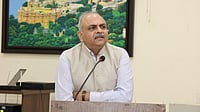Simplicity and higher returns in the new tax regime would compensate for the benefits in the older one, encouraging more people to migrate going forward, said Sanjay Malhotra, Revenue Secretary, in an interview with Outlook Business.
The Union Budget for 2024-25 tried to further incentivise taxpayers to choose the new tax regime. Despite the government’s continuous push, some taxpayers are still staying loyal to the older one for investment related benefits.
Malhotra believes that they will soon recognise that even though these benefits are not in the new tax regime, the returns would be higher for them, due to lower rates and greater flexibility while investing.
“They can then use these gains to make significant purchases, like buying a house later on. This flexibility allows for better financial planning,” he said.
Speaking about the Budget, the Revenue Secretary addressed issues concerning both direct and indirect taxes.
Edited Excerpts:
The fiscal deficit target of 5.1 per cent was already an impressive number in the Interim Budget, and now we have this estimate of 4.9 per cent. What model is working behind this?
The reduction is primarily due to the higher-than-budgeted dividend coming in from the RBI (Reserve Bank of India). This has been the main contributing factor. Other revenues are increasing only very marginally, so they do not significantly contribute to the reduction.
But primarily, the fiscal deficit is decreasing because revenue is increasing at a higher pace than expenditure. In which, the RBI dividend is playing the major part.
There are still some considerable benefits in the old tax regime. Where the newer one is simpler, the older one seems more attractive to some when investing in assets. In such case, is absolute migration possible?
Last year, we predicted that at least half would shift. Currently, the shift is on the higher end of our prediction and we are happy with this outcome.
I think most people have calculated which regime is more beneficial to them from a tax payment point of view and have made their decisions accordingly. Going forward, we expect more people to be attracted to the new regime for the reason you mentioned, which is simplicity.
Today, some taxpayers may not switch to the new regime because they have already made investments, such as taking out a house loan, which benefits them more under the old scheme. However, going forward, people will recognise that while these benefits are not available in the new tax regime, the rates are lower.
They will have the flexibility to invest in house loans, equities, or other areas that might not have tax benefits but can offer higher returns. They can then use these gains to make significant purchases, like buying a house later on. This flexibility allows for better financial planning.
In the future, simplicity and flexibility, along with lower taxation, will encourage and incentivise more people to choose the new tax regime, making it more beneficial for them.
Removal of the Angel Tax was a pleasant surprise to the industry. A general perception, however, has been that India’s tax policies are a major hurdle for businesses to grow. What dialogue are you having regarding this with the industry?
It is always our endeavour to take a collaborative approach, not an adversarial one. We strive to consult as much as possible. We had consultations with all major chambers and key stakeholders to ensure their input and collaboration in our financial policies and decision-making.
We have been working with economists, various interest groups, labour and farm labour unions, farmers, and farmer associations. Even post-budget, we continue to meet with various stakeholders. We aim to do this not only around the budget period but throughout the year. This engagement happens not just at headquarter or department level, but also at the field level, ensuring comprehensive and continuous stakeholder involvement.
We reach out to taxpayers and stakeholders at all levels—formation, state, and district. We will continue to do this and try to improve it further.
In this budget and over the previous years, the focus has been on the taxpayer. Our reforms, whether it is the GST (goods and services tax) to simplify indirect taxation laws, or the faceless system to remove friction and human interface, are all aimed at making the process more convenient and electronic. We have implemented numerous measures for simplification and improvement in tax administration to enhance the overall experience for taxpayers.
Did you consider any compensation to the removal...
The angel tax was not a revenue measure; its primary purpose was to restrict funding and combat money laundering. Revenue generation was never a major, or even minor, consideration.
How are you viewing the Pillar 1 GloBE rule?
We have been engaging in a constructive engagement with all countries in the inclusive framework to find solutions. There are some concerns which we have raised with the secretaries and countries involved.
We aim for fairness for all, particularly for developing countries like ours. Unless we secure a fair deal, we cannot proceed. The interests of the country are paramount in these negotiations.
How is the government going to approach the pending agenda of rationalisation of GST rates? Chairman of the Prime Minister’s advisory council on economy suggests it to be a top priority for the new government.
The Finance Minister has very categorically said we would like to do it. But we have to keep in mind that it has to be revenue neutral. Rationalising tax rates presents significant challenges. For instance, if we reduce the number of tax rates, it may not be acceptable to the governments because they could lose revenue. Conversely, increasing the number of rates would also not be acceptable.
We have seen this with capital gains rationalisation—while many are satisfied with the changes, some are not. It is challenging to create a rationalisation that makes everyone happy because some rates will inevitably increase. This process must be handled very carefully due to its sensitivity and the potential impact on various stakeholders.
Sequencing of tax reforms since 2014 has been of great help to manufacturing, but still, there is a lot to be desired. How do you plan to take it forward?
As you are aware, we have taken a number of steps and will continue to do so. Let me clarify that custom duties are not primarily for revenue generation; that is a secondary objective. The main purpose is to provide a level playing field and ensure competitiveness for our domestic industry where necessary.
On the direct taxes side, we already have very reasonable tax rates for domestic companies, which support their growth and competitiveness. In this budget, we have reduced taxes on foreign companies, making it more attractive for them to operate in India. This move aims to enhance our competitiveness on an international level.
The third important aspect, beyond rates and custom duties, is reducing the compliance burden and the cost of paying taxes. Over the last 7-10 years, this government has focused on simplification and rationalisation. GST is a prime example of how compliance and logistics costs have reduced. Similarly, on the corporate tax side, we now have a single, simplified tax rate, which is more important than just having a low rate. This simplification helps ease the process and reduces the burden on taxpayers.
Another example is the removal of the angle tax. Although it affected only a small percentage, its removal addresses compliance burdens and the associated fear.
Some key industry related agendas like GST for online gaming were not taken up in the previous council meet. Will they be part of the coming one?
There were many agenda items in the previous meeting, which is why some could not be taken up. The committee had just been formed, and the budget session, along with another session, limited the available time. Now we plan to have another meeting and hopefully, will take these issues.




























